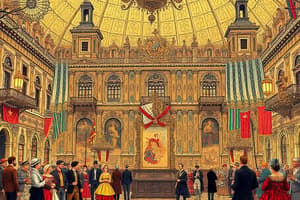Podcast
Questions and Answers
Which of the following demands were characteristic of the protesting youth movement?
Which of the following demands were characteristic of the protesting youth movement?
- Establishing a constitution and political participation. (correct)
- Suppressing freedom of the press and opinion.
- Maintaining the power of the existing principalities.
- Restricting rights for the people.
After the Congress of Vienna in 1815, Germany remained a unified nation-state.
After the Congress of Vienna in 1815, Germany remained a unified nation-state.
False (B)
What was the name of the event in 1832 that became a major protest demonstration.
What was the name of the event in 1832 that became a major protest demonstration.
Hambacher Fest
As a reaction to the protests, the rulers forbade ______.
As a reaction to the protests, the rulers forbade ______.
Match the following aspects of the German Revolution of 1848 with their description:
Match the following aspects of the German Revolution of 1848 with their description:
What was a central question for the Revolution?
What was a central question for the Revolution?
The Frankfurt National Assembly worked on a constitution that should secure citizen's rights.
The Frankfurt National Assembly worked on a constitution that should secure citizen's rights.
Name one of the places where the unrest of the day was particularly obvious.
Name one of the places where the unrest of the day was particularly obvious.
According to the three aspects, the targets of the revolutionaries are: Democrats, civil rights and ______.
According to the three aspects, the targets of the revolutionaries are: Democrats, civil rights and ______.
What action was taken against students by authorities in response to the youth protests?
What action was taken against students by authorities in response to the youth protests?
Flashcards
Pressefreiheit (Press Freedom)
Pressefreiheit (Press Freedom)
Freedom to publish opinions in newspapers or other media without government censorship.
Meinungsfreiheit (Freedom of Opinion)
Meinungsfreiheit (Freedom of Opinion)
The right to express one's opinions without censorship, restriction, or fear of retaliation.
Versammlungen verboten
Versammlungen verboten
Meetings are prohibited.
Forderungen der Revolutionäre (Demands of Revolutionaries)
Forderungen der Revolutionäre (Demands of Revolutionaries)
Signup and view all the flashcards
Deutsche Nationale Einheit (German National Unity)
Deutsche Nationale Einheit (German National Unity)
Signup and view all the flashcards
Verfassung mit Grundrechten (Constitution with Basic Rights)
Verfassung mit Grundrechten (Constitution with Basic Rights)
Signup and view all the flashcards
Nach dem Wiener Kongress 1815 (After the Vienna Congress 1815)
Nach dem Wiener Kongress 1815 (After the Vienna Congress 1815)
Signup and view all the flashcards
Proteste der Jugend (Youth Protests)
Proteste der Jugend (Youth Protests)
Signup and view all the flashcards
Study Notes
- The topic is about youth protests
Demands of the Protesters
- They wanted a constitution and political participation
- They wanted more rights for the people
- They wanted a suitable Germany
- They wanted freedom of the press and freedom of opinion
Background Information
- After the Vienna Congress in 1815, Germany remained divided into many principalities
- The princes had more power than the people, who had hardly any say
- The Hambach Festival in 1832 became the largest protest rally of this time
Reaction of the Rulers
- Rulers forbade assemblies
- Students were expelled from universities
The Revolution of 1848
- Aspects of the German Revolution of 1848, which were demanded
Freedom of The Press and Political Participation
- Revolutionaries demanded free elections
- Freedom of the press and freedom of assembly
- Became particularly clear about the riots in Berlin and Vienna
A German National State
- The question of national unity was central to the revolution
- The National Assembly discussed whether Germany should become a unified national state, with or without Austria
A Constitution with Basic Rights
- The Frankfurt National Assembly drew up a constitution that was supposed to secure the rights of citizens
- This demonstrated the desire for a constitutional state
- These three aspects show the political and social goals of the revolutionaries: democracy, civil rights and national unity
Studying That Suits You
Use AI to generate personalized quizzes and flashcards to suit your learning preferences.




